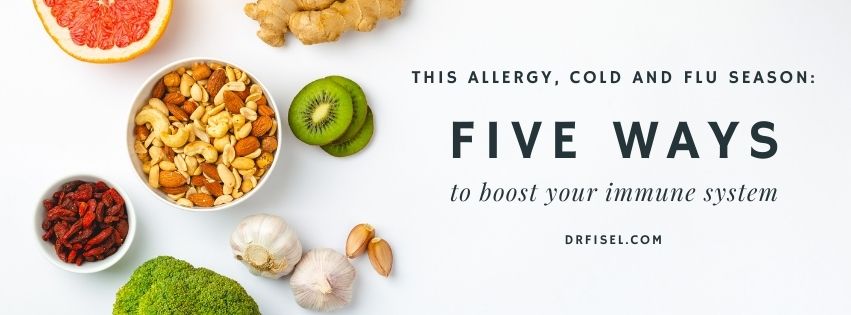
With kids back in school,
and adults going back to the office…
We are all noticing sniffly noses, congestion, scratchy eyes and throats.
WE ARE IN THE MIDST OF ALLERGY, COLD AND FLU SEASON!
And, after many months of isolated conditions, our immune systems have gone into overdrive. If you are like so many others, you might be wondering how to maintain your health this year. Use this list to be proactive during allergy/ cold and flu season:
FIVE WAYS TO BOOST YOUR IMMUNE SYSTEM
- Get some sleep! One of the major ways our immune systems weaken is when our bodies aren’t given the proper chance to recharge. Remember to practice sleep hygiene: turn off screens one hour before bed, dim the lights, use lavender in your diffuser, or take a warm bath. Avoid overworking and staying out late.
- Eat with your immune system in mind. The following foods are immune boosters: pumpkin seeds, mushrooms, broccoli, spinach, elderberry extract, astragalus root, ginger, turmeric and garlic. Avoid processed foods, alcohol, and any foods that might cause inflammation especially if you are sensitive to histamines.
- Supplement your nutrition when necessary. In winter months when natural sources of Vitamin C (fresh fruit) and D (the sun) are scarce, it’s essential to supplement your nutritional regimen with those vitamins and Zinc as well. We carry a number of herb/nutrient combinations at the office that can assist in boosting your immune function, as well as products to help lower your susceptibility to allergy symptoms.
- Make lifestyle choices that support immune health. Here are a few suggestions for daily living that will support your immunity as well:
- Disinfect your environment by washing hands and surfaces in your home.
- Take your shoes off at the door.
- Avoid large indoor gatherings when possible.
- Pay attention to indoor and outdoor air quality to eliminate allergens that might exacerbate symptoms.
- Continue to focus on the basic pillars of health: movement, nutrition, hydration and sleep.
- Keep your nose and throat clear. Using a nasal and/ or throat spray daily is a helpful way to flush allergens and germs out of your system where they normally locate. You can also incorporate steam inhalation, using essential oils such as eucalyptus and thyme, which is a great way to naturally get rid of foreign microbes within the upper respiratory tract.
We know that our immune systems are facing down a barrage of irritants this allergy, cold and flu season. It’s time to get proactive with your health and make sure you have immune boosters on hand in your pantry and bathroom cabinet to make sure you remain as healthy as possible this fall/ winter. Dr. Fisel can help you find natural solutions and relief if you are battling with the symptoms of allergies, colds, or the flu. If you live in the Guilford/ Branford/ New Haven/ Madison/ Clinton area and would like to learn more about the innovative programs Dr. Fisel has to offer, call (203) 453-0122 or CLICK HERE to schedule a consultation.
RESOURCES:
https://www.healthline.com/health/food-nutrition/foods-that-boost-the-immune-system




